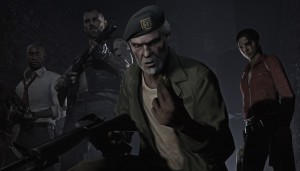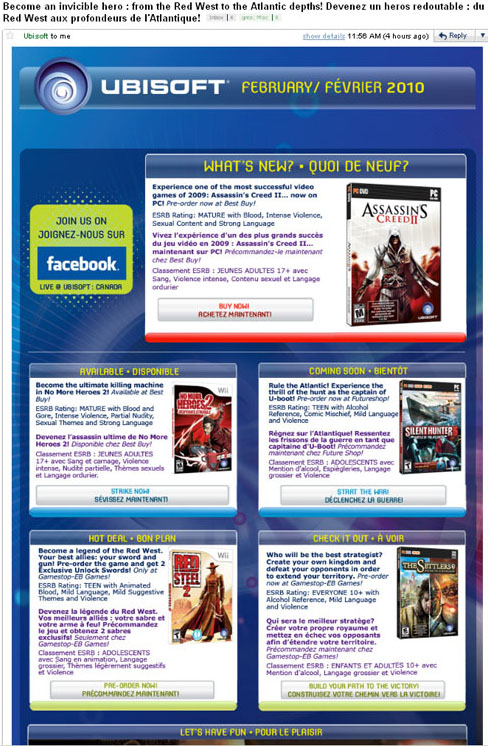A Narrow Escape
 I’m standing at the edge of the storm drain tunnel, surveying the battleground-to-be. It stinks of sewage. Beside me stands my good friend, A.I. Francis. He’s a scofflaw who plays by no one’s rules; yet he’s always at my side, that big lovable lug. No matter the situation, he stands tall. His words are few, but they always entertain and encourage. A sharpshooter regardless of weapon, he makes quick work of the most menacing threats before I even know they’re taking an interest in me. Cover? He could care less — it’s mine. Yet beneath that brutish exterior lies a caring friend, who sacrifices time and well-being to pull me back to my feet when I’m down for the count.
I’m standing at the edge of the storm drain tunnel, surveying the battleground-to-be. It stinks of sewage. Beside me stands my good friend, A.I. Francis. He’s a scofflaw who plays by no one’s rules; yet he’s always at my side, that big lovable lug. No matter the situation, he stands tall. His words are few, but they always entertain and encourage. A sharpshooter regardless of weapon, he makes quick work of the most menacing threats before I even know they’re taking an interest in me. Cover? He could care less — it’s mine. Yet beneath that brutish exterior lies a caring friend, who sacrifices time and well-being to pull me back to my feet when I’m down for the count.
Also, Curtis and Kai are there.
And “there” is where we stand for the umpteenth time: The Drains, Survival mode, Left 4 Dead. Once again, we prepare to face our inevitable demise at the hands (and feet, and teeth) of the undead. Our only goal: through teamwork, coordination, and selflessness, prolong that foregone conclusion enough to best our previous time. A gold medal awaits us, if we can only crack that 10-minute timer.
Some may see this as pointless: Einstein defined insanity as doing the same thing repeatedly and expecting a different result. Or perhaps this is an exercise in determination: the Latin rebuttal might be “possunt quia posse videntur,” roughly, “they can because they think they can.” Maybe throw in the Browncoats’ “When you can’t run anymore, you crawl, and when you can’t do that, you find someone to carry you” for good measure. Or perhaps digress with Tony Soprano’s “Why don’t you get the hell out of here before I shove your quotations book up your fat fucking ass.”
We all take a deep breath, and think back to our previous round, focusing on making amends for the error that caused our house of cards to tumble. We’ve persevered without the help of any map glitch (i.e., we haven’t found one yet). As each attempt has failed, our tactics have been refined. The Bronze medal time has been beaten. The Silver medal, snatched. We’ve collectively become attuned to the rhythms laid out by the AI Director. We’ve slowly learned the steps to this dance.
Cue the music.
The frantic strings of the orchestra match our movements as our crosshairs dart about, attempting to locate the source of the gargle. It grows louder. A tidal wave of undead thunders towards us. We cut them down with efficiency, merging lines of fire, not panicking as strays trickle by the front line. We fire and reload in shifts, turning our gang of four into a prickly man-of-war. We keep our precious pipe bombs tucked in our belts, knowing we are doing far too well to waste them now.
We’ve learned much since our first confused attempt: we know where to stand, where to fire, and when to fall back together. But soon our pattern breaks. As Hunters pounce, Smokers ensnare and drag, and Boomers vomit pus, we break rank to save each other at the expense of getting clawed, punched, kicked and bitten. This bullets-and-blood orgy climaxes with the arrival of the monstrous Tank. Suddenly, nothing else matters. Our fire converges. If we’re fortunate, not one of us has to take his lumps this time around.
Afterward, there is a brief lull — enough to heal up, reload, reposition — but the next wave is soon upon us. We brace ourselves, between us, one less medkit, a little less health, and a lot less ammo. The horde arrives. A shotgun blast rips off a chunk, but it’s just the outer layer of this rotten gaggle. We work on cutting our way to the core.
Then, somehow, a Boomer sneaks in and spews green paste — Axe cologne for zombies — all over us, even A.I. Francis. Blinded, we stumble backward — the front line collapses. The horde’s numbers multiply, and the counter slowly ticks: fire, sneak in a shell, fire twice, sneak in a shell, fire three times, until, the chamber is empty. We scramble to unholster our pistols. We fire wildly. We desperately swing the butts of our guns, trying to reload.
Then, someone throws a pipe bomb. We are granted 10 seconds of silence.
Bloodied, exhausted, and down to our last few rounds, we try to collect ourselves. But in the end — the way it always ends in Survival mode — we are one by one, torn apart by chipped fingernails and browned teeth. There is no escape from the undead.
But this is not the escape I speak of. What I somehow managed to avoid is both the bane and badge of honour for every so-called “hardcore” gamer: the marathon session.
At this point, we had been playing for more than four hours (child’s play, I know), with a short break somewhere in between (we’re adults, FFS). But Kai, a model of self-restraint, called it quits and left. Since A.I. Francis and now A.I. Bill are always ready to roll, Curtis and I were left, waffling, looking for any excuse to keep playing, and looking for any excuse to stop. After Pong-ing “only if you want to” and “it’s up to you” for a few rounds, I paused to gather the willpower to blurt out the suggestion that we stop, nearly changing my mind mid-sentence.
And there it ended.
A few minutes after walking away from my PC, I felt regret. Why stop a good thing? Even the stoic Kai, who normally signs off with “gg”, instead elatedly parted with "great game". Curtis and I didn’t know if the next session would be this much fun. We could easily have put in another couple of hours. We were were chipping away at that timer, getting a few seconds closer to Gold. We were in the zone.
But seasoned gamers, the ones who know how marathon sessions make them forget their personal responsibilities, health, and hygiene, understand that “in the zone” can morph into a meaningless blanket statement. More often than not, it’s just a delusional explanation for not having showered or eaten in three days.
I believe all gamers can find themselves in the clutches of whichever title they happen to be enjoying. It doesn’t matter if it’s Peggle, Counter-Strike, Animal Crossing, or World of Warcraft. Games are engaging. And anyone who plays has the capacity to suddenly find herself engaged in a marathon session, or ask himself how in the hell “just one more turn” turned into “do I hear birds chirping?” It’s one of many ways of earning your gaming stripes.
However, anyone who’s been through enough marathon sessions has the capacity to learn that the most appropriate metaphor for a finish line is dropping dead. As tough as it may be, knowing when to stop and resume your “other” life is the right choice. That’s one of many ways of earning your gaming stars.
But son of a bitch, we should’ve kept playing.

